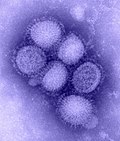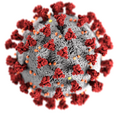Public health emergency of international concern
Public Health Emergency of International Concern (PHEIC) is a formal declaration by the World Health Organization (WHO) of an extraordinary event which is determined to constitute a public health risk to other States through the international spread of disease and to potentially require a coordinated international response. This concept is rooted in the International Health Regulations (IHR) (2005), which is a legally binding agreement involving 196 countries to build the capability to detect and report potential public health emergencies worldwide.
Definition and Criteria[edit]
A PHEIC is defined in the IHR (2005) as “an extraordinary event which is determined, as provided in these Regulations: (i) to constitute a public health risk to other States through the international spread of disease; and (ii) to potentially require a coordinated international response.” The decision to declare a PHEIC is made by the WHO Director-General and is based on the advice of an Emergency Committee, which is composed of international experts in public health, epidemiology, infectious diseases, and related fields.
The criteria for declaring a PHEIC include:
- The seriousness of the public health impact of the event;
- The unusual or unexpected nature of the event;
- The risk of international spread of the disease;
- The risk of interference with international traffic.
History and Examples[edit]
The concept of a PHEIC was introduced in the 2005 revision of the International Health Regulations, which came into force in 2007. Since then, several events have been declared as PHEICs, including the 2009 H1N1 influenza pandemic, the 2014 polio declaration, the 2014-2016 Ebola outbreak in West Africa, the 2016 Zika virus epidemic, and the 2019-2020 COVID-19 pandemic.
Response and Implications[edit]
When a PHEIC is declared, the WHO provides temporary recommendations to countries to prevent or reduce the international spread of disease, while avoiding unnecessary interference with international traffic and trade. These recommendations may include health measures to be implemented by countries, such as screening at borders, information to be provided to travelers, and quarantine measures.
The declaration of a PHEIC also mobilizes international resources and expertise to support the affected countries, and it increases the global awareness and political commitment to control the outbreak.
Challenges and Criticisms[edit]
The PHEIC mechanism has faced challenges and criticisms, including delays in declaration, political considerations influencing the decision-making process, and the adequacy of the international response. There have also been discussions about the need to improve the global health emergency response framework, including better funding mechanisms, strengthening health systems in vulnerable countries, and ensuring equitable access to medical countermeasures.
See Also[edit]
| Global health | ||||||||||
|---|---|---|---|---|---|---|---|---|---|---|
This Global health related article is a stub.
|
-
World Health Organization Logo
-
World Health Organisation Regional Offices
-
H1N1 Influenza Virus
-
SARS-CoV-2
-
World MERS Outbreak
Ad. Transform your life with W8MD's Budget GLP-1 injections from $75


W8MD offers a medical weight loss program to lose weight in Philadelphia. Our physician-supervised medical weight loss provides:
- Weight loss injections in NYC (generic and brand names):
- Zepbound / Mounjaro, Wegovy / Ozempic, Saxenda
- Most insurances accepted or discounted self-pay rates. We will obtain insurance prior authorizations if needed.
- Generic GLP1 weight loss injections from $75 for the starting dose.
- Also offer prescription weight loss medications including Phentermine, Qsymia, Diethylpropion, Contrave etc.
NYC weight loss doctor appointmentsNYC weight loss doctor appointments
Start your NYC weight loss journey today at our NYC medical weight loss and Philadelphia medical weight loss clinics.
- Call 718-946-5500 to lose weight in NYC or for medical weight loss in Philadelphia 215-676-2334.
- Tags:NYC medical weight loss, Philadelphia lose weight Zepbound NYC, Budget GLP1 weight loss injections, Wegovy Philadelphia, Wegovy NYC, Philadelphia medical weight loss, Brookly weight loss and Wegovy NYC
|
WikiMD's Wellness Encyclopedia |
| Let Food Be Thy Medicine Medicine Thy Food - Hippocrates |
Medical Disclaimer: WikiMD is not a substitute for professional medical advice. The information on WikiMD is provided as an information resource only, may be incorrect, outdated or misleading, and is not to be used or relied on for any diagnostic or treatment purposes. Please consult your health care provider before making any healthcare decisions or for guidance about a specific medical condition. WikiMD expressly disclaims responsibility, and shall have no liability, for any damages, loss, injury, or liability whatsoever suffered as a result of your reliance on the information contained in this site. By visiting this site you agree to the foregoing terms and conditions, which may from time to time be changed or supplemented by WikiMD. If you do not agree to the foregoing terms and conditions, you should not enter or use this site. See full disclaimer.
Credits:Most images are courtesy of Wikimedia commons, and templates, categories Wikipedia, licensed under CC BY SA or similar.
Translate this page: - East Asian
中文,
日本,
한국어,
South Asian
हिन्दी,
தமிழ்,
తెలుగు,
Urdu,
ಕನ್ನಡ,
Southeast Asian
Indonesian,
Vietnamese,
Thai,
မြန်မာဘာသာ,
বাংলা
European
español,
Deutsch,
français,
Greek,
português do Brasil,
polski,
română,
русский,
Nederlands,
norsk,
svenska,
suomi,
Italian
Middle Eastern & African
عربى,
Turkish,
Persian,
Hebrew,
Afrikaans,
isiZulu,
Kiswahili,
Other
Bulgarian,
Hungarian,
Czech,
Swedish,
മലയാളം,
मराठी,
ਪੰਜਾਬੀ,
ગુજરાતી,
Portuguese,
Ukrainian




